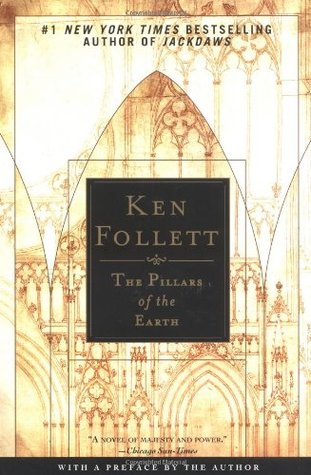Review: Ken Follett’s “The Pillars of the Earth”
by Miles Raymer
This is one of the strangest and most disappointing books I’ve ever read. Reaching back to 12th-century Britain, The Pillars of the Earth vividly describes the architecture, landscapes, and challenges faced by denizens of the Middle Ages. Sadly, this potentially great project is brought low by Ken Follett’s shockingly poor writing. Follett combines the deep knowledge of a seasoned historian with the prose of a literary simpleton; the result is an ambitious story whose emotional impact is undercut by the author’s complete lack of artfulness.
I created a term a while back for people like Follett: plot artist. It doesn’t feel appropriate to refer to him as a “writer,” because a writer has to be aware of the impact of language, of how words shape the tone of a moment or scene. Follett seems completely ignorant of this dynamic, and contents himself with utilizing language that hovers around a 6th-grade reading level. Moreover, Follett makes little effort to reconstruct the vernacular of the time, and freely uses modern phrases and terms that didn’t become a part of the English language until centuries later.
It’s important to note that this book’s content is far from childish. Follett is overfond of describing gruesome violence, and appears to be even more fascinated with the dynamics of violent rape. His descriptions of these scenes––which show up with gratuitous frequency––are invariably cringe-worthy. Even the scenes that include consensual sex––equally frequent––are so bluntly penned as to be laughable.
Books that are nearly 1,000 pages long have an obligation to earn their page-counts. The Pillars of the Earth fails magnificently in this regard. Follett loves to waste the reader’s time recounting earlier events in ways that are neither useful nor poignant, and never misses a chance to over-explain the inner thoughts of his characters. Follett and his editors appear to think that anyone interested in this sort of novel must be a complete idiot who is incapable of drawing simple connections between obviously-related story elements.
The Pillars of the Earth is not without its strengths. Follett’s understanding of 12th-century architecture is superb, as are his depictions of how moral calculus happened in a world dominated by rigid hierarchies and dogmatic religious practices. There are lots of interesting tidbits here for anyone looking for a window into the daily struggles of commoners as well as wealthy people during this time in British history. Follett is also adept at showing how certain characters gain or lose favor over time. In general, his characters are strong and dynamic, and their various plot threads come together nicely, even as Follett’s language prevents them from attaining the levels of the complexity and mystery we typically look for in an epic novel.
This book’s middle third cashes in on the promise of the introduction, but I found the final few chapters completely boring. The falling action plays out pretty much exactly as any perceptive reader might assume, without anything that feels genuinely surprising or innovative. Follett’s attempt to tie the conclusion into the famous martyrdom of Thomas Becket is awkward and lifeless.
Unless you are inordinately interested in this particular period of European history and/or the evolution of Gothic cathedrals, I recommend that you stay away from this book.
Rating: 3/10

I never read the book but I enjoyed the mini series. It stars Eddie Redmayne, Rufus Sewell and Donald Sutherland.
Good tip, and I really like that cast! Maybe I’ll check it out. I definitely think this is one of those rare books that might be better as a film or show adaptation.
Thanks for reading!
thataboy, don’t pull punches! it’s important when the emperor has no clothes, somebody says it.
Haha, thanks for the encouragement!
I agree entirely with this review. The novel starts out well but gets progressively worse. I was hugely disappointed. The plot is contrived, with many unbelievable coincidences. Follett feels a need to continually remind readers of information already given earlier in the book; this habit is irritating at best. I don’t find the strong women characters credible for the 1100s era. There are many more problems.